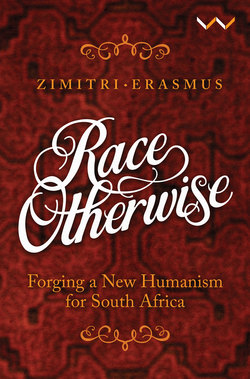Читать книгу Race Otherwise - Zimitri Erasmus - Страница 17
На сайте Литреса книга снята с продажи.
Unclassified
ОглавлениеWhen I joined the University of the Witwatersrand in 2011, I did not tick the box for the racial category Coloured on the form provided by the university’s human resources department. I refused to classify myself by race. In the space that lists apartheid’s racial categories, I wrote a note informing the administrator of my refusal to comply with this request. I question the use of a classification system which is premised on this crude racialised way of knowing. That I denounce the continued use of race categories, albeit for racial redress in post-1994 South Africa, does not imply that I disavow the ways in which South Africans have been racialised. Nor does it imply that I deny the continued legacy of the effects of these categories on everyday life. I am after cultivating indicators for historical exclusion that are premised on a way of coming to know that recognises and disrupts these effects without resorting to race classification.
In 2015, in an effort to promote the transformation of the academic staff body at this historically white institution, the office of the Vice Chancellor at my university called on black African South African and Coloured staff to meet with him in order to discuss the university’s decision to set aside funding for the advancement and recruitment of black African and Coloured staff. The rationale for gathering staff by race classification was that staff classified Indian are over-represented, and that black African staff are silenced in meetings dominated by white staff. International staff members – non-South Africans from the African continent as well as from other parts of the world – were excluded from this call because the Employment Equity Act No. 55 of 1998 deems international staff ineligible for interventions towards equity.
How did the office of the Vice Chancellor know which staff were black African and which were Coloured? It used race classifications recorded in the university’s human resources database and invited staff members who had presumably selected to classify themselves by race.
I was and remain unclassified and did not receive this invitation. Nevertheless, I attended the meeting because a colleague (ironically, considered white and foreign) told me about it. These questions remain with me: What kinds of conversations and outcomes might be generated if staff are gathered by academic rank, not race classification, in order to discuss matters of transformation? What kinds of conversations and outcomes might be generated if transforming the composition of academic staff were made a central concern for the entire university community, irrespective of race classification? When will white people cease to be the noise in the room in a country with a black majority, a minority of whom are part of a growing and empowered elite? As a beneficiary of funds for the advancement of black African and Coloured staff, how do I relate with integrity towards colleagues (close and not so close to me) who are equally qualified but are deemed ineligible for such financial support? How do I resist the translation of my blackness into a currency?
